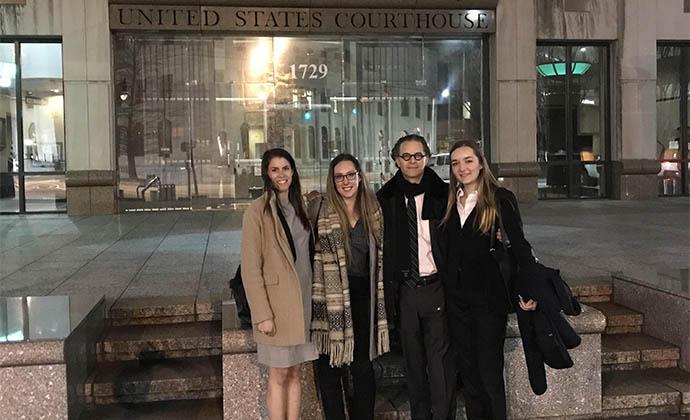Federal District Judge Grants Doyle Lee Hamm Stay of Execution
Media Contact: Public Affairs, 212-854-2650 or [email protected]
New York, February 6, 2018—Federal district judge Karon O. Bowdre, chief judge of the United States District Court for the Northern District of Alabama, today issued a written opinion staying the execution of Doyle Lee Hamm scheduled for Feb. 22, 2018.
The ruling in the 30-year-old death penalty case followed a day-long hearing on Jan. 31 at the Hugo L. Black Federal Courthouse in Birmingham which included lengthy witness testimony, evidence, and legal arguments presented by Columbia Law School Professor Bernard E. Harcourt, who has represented Hamm pro bono now for 28 years.
Hamm (pictured below in 1981), who was convicted and sentenced to death in 1987 for the robbery-murder of a Cullman County motel clerk, Patrick Cunningham, has been battling lymphatic cancer and carcinoma for over four years.
Bowdre issued a detailed and lengthy 25-page opinion, ultimately ruling that “based on the record as it currently exists, Mr. Hamm has shown a substantial likelihood of success on the merits, and the court finds that the execution date must be stayed pending an independent medical examination of Mr. Hamm."
“Judge Bowdre’s opinion is stunning, and shows full command and comprehension of the medical issues,” Harcourt said. “It’s not only judicious, it’s also air-tight insofar as the judge found that there is a significant likelihood that Doyle Hamm will prevail and demonstrate a substantial risk of an unnecessarily painful and torturous execution if lethal intravenous injection is attempted given his history of cancer and cancer treatment and the present medical condition of his veins.”
Mark Heath, M.D., an anesthesiologist and professor of medicine at Columbia University who had visited Hamm in prison in Sept. 2017 to assess his medical condition, testified for several hours in camera, in the judge’s conference room, because the lethal injection protocol in Alabama is confidential and cannot be discussed in public. Heath explained to Judge Bowdre that due to the Hamm’s inaccessible veins, there was a high probability that intravenous lethal injection could cause Hamm to become paralyzed and consciously suffocate, leading to “an agonizing death.”
Charles David Blanke, M.D., an experienced oncologist from Oregon who specializes in medical aid in dying, which is legal in Oregon, testified about the protocols for physician-assisted end-of-life, demonstrating the comparative humaneness, effectiveness, and reliability of the oral procedure—99.4% effectiveness, with onset of unconsciousness in about five minutes and death in about 25 minutes, far more reliable than a lethal IV injection.
According to data compiled by the Death Penalty Information Center, seven percent of lethal injections in the U.S. between 1890 and 2010 were botched.
Harcourt was accompanied at the hearing and assisted by his legal team, which included, present at the hearing, two third-year Columbia Law students, Nika Cohen ’18 and Phoebe Wolfe ’18, and two recent Columbia undergraduates, Isadora Ruyter-Harcourt BC ’16 and Egon Von Conway CC ’17. They presented a total of 45 exhibits for Hamm in contrast to the 11 exhibits for the state.
Harcourt also today filed a petition for clemency with the governor of Alabama, Governor Kay Ivey, asking for her mercy, which is receiving increasing international attention.
# # #
Recommended reading:
Updates on the case of Doyle Lee Hamm
Professor Bernard E. Harcourt’s op-ed in the New York Times
Professor Bernard E. Harcourt Argues Death Penalty Case Before 11th U.S. Circuit Court of Appeals
The Long Defense of the Alabama Death-Row Prisoner Doyle Lee Hamm

